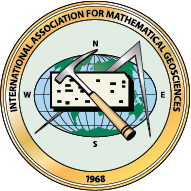Distinguished Lecturer
A. Description
The Distinguished Lecturer prepares a series of lectures preferably on a variety of subjects in the mathematical geosciences to be presented in places where IAMG Annual Meetings are not normally held.
B. Guidelines
The IAMG council voted in 2000 to establish a Distinguished Lecture series and approved a committee charged with implementing the recommendations contained in the report of the IAMG Lecture Series Commission (July 2000).
The purpose of the IAMG Distinguished Lecture series is to demonstrate to the broader geological community the power of mathematical geology to address routine geological interpretation and to deliver this knowledge to audiences in selected parts the world. Therefore, the Lectures Committee is seeking nominations for outstanding individuals who meet the following criteria:
- A demonstrated ability to communicate mathematical concepts to a general geological audience.
- A clear enthusiasm for mathematical geology.
- Recognition for work in their field.
- Established skill in working with individuals and in group discussions on geological problems.
The Distinguished Lecturer must be ready to travel and to perform the following duties:
- Prepare and present a lecture suitable for a general geological audience.
- Prepare and present one or two lectures on a more specialized topic.
- Interact and hold discussions with individuals, both professionals and students, on applications of mathematical geology to local problems of interest.
Letters of nomination should include a curriculum vitae of the nominee and a short statement summarizing the ways in which he or she fulfills the nomination criteria.
Letters should be directed to the Chair of the Distinguished Lecture Series Committee by e-mail to :
Or by regular mail to :
Christien Thiart
Department of Statistical Sciences University of Cape Town
Private Bag Rondebogch 7700
South Africa
C. Current Distinguished Lecturer (2024) – Michael Pyrcz
Michael Pyrcz is a professor in the Cockrell School of Engineering, and the Jackson School of
Geosciences, at The University of Texas at Austin, where he researches and teaches subsurface, spatial data analytics, geostatistics, and machine learning. Michael is also the principal investigator of the Energy Analytics freshmen research initiative and a core faculty in the Machine Learn Laboratory in the College of Natural Sciences, The University of Texas at Austin, an associate editor for Computers and Geosciences, and a board member for Mathematical Geosciences, the International Association for Mathematical Geosciences. Michael has written over 60 peer-reviewed publications, a Python package for spatial data analytics, and co-authored a textbook on spatial data analytics, ‘Geostatistical Reservoir Modeling’.
All of Michael’s university lectures are available on his YouTube channel with links to 100’s of Python
interactive dashboards and well-documented workflows, to support his students and working professionals with evergreen content. To find out more about Michael’s work and shared educational resources visit his website.
YouTube Channel: www.youtube.com/GeostatsGuyLectures
GitHub Repositories: https://github.com/GeostatsGuy/
Personal Website with Inventory of Shared Resources: www.michaelpyrcz.com
e-mail: mpyrcz@austin.utexas.edu
Abstracts:
Integrating Geostatistics into Data Analytics and Machine Learning
The subsurface resource industry has a long history of working with large, complicated geoscience and engineering datasets. Our community has been working with ‘big data’ for decades, driving the development and establishment of the geostatistical toolbox. As a result, we are uniquely prepared for the data science revolution, as we are further down the road of data-driven workflow development and have insights and experiences to share with the other scientific and engineering domains. The foundation of geostatistics, domain expertise, spatial continuity, scale and uncertainty remain essential, even with advanced deep learning architectures; therefore, many new data analytics and machine learning technologies are not ready off-the-shelf for subsurface applications. I elucidate opportunities to integrate geostatistics into data analytics and machine learning for success in the subsurface.
Deep Learning for Building Subsurface Models
The transition from variogram-based to object- and rule-based modeling has been motivated by an increasing necessity to integrate geological heterogeneity into our conditional subsurface uncertainty models to support development decision making. Now, new generative, deep learning models have emerged as the next step along this evolutionary path towards realism. It is time to pause, take stock, review these generative methods, and critically evaluate their performance, e.g., to evaluate their conditional performance in a quantitative manner. When do they work well and when do they break?
I Can Teach You Machine Learning in 1 Hour
Subsurface engineers and geoscientists are familiar with data, statistics and models; therefore, they are well-positioned to add machine learning skills to their toolkit. I know this because I have taught machine learning to over 2,000 working subsurface professionals over the past couple of years. Spend an hour with me and I’ll leverage your subsurface expertise to get you started with machine learning.
New Ideas for Mathematical Geoscience Education from Data Science
New open source tools are changing the way we build subsurface workflows. We now leverage the world’s brilliance to code less, work faster, learn more from our systems, and get more done. In addition, these new tools are helping us communicate and teach. Interactive slides with live plots, interactive dashboards and well-documented workflows are all enhancing education beyond the typical static slides and textbooks. The best way to learn mathematical geoscience is to play with data, models and systems. New open source tools make this a reality in the classroom. I’ll show you how to do this to improve your communication and impact in academia or industry.
D. Upcoming Distinguished Lecturer (2025) – Jeff Boisvert
